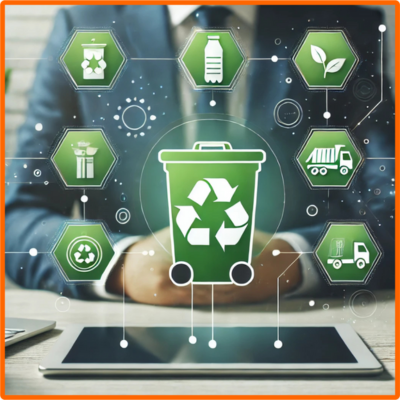Plastic, Battery, Tyre, Oil Waste Management
- ● Consulted 1500+ EPR Registrations
- ● Free Experts Assistance
- ● Minimum Price guaranteed
- ● Quick and Hassle-Free Process
- ● Free Consultation on Import-Export Compliance
- ● 20 years experience & Serving more than 1100+ companies
- ● Providing one stop solution for all Annual compliances

What Is Plastic Waste Management
Extended Producer Responsibility applies to any organization that introduces plastic packaging to the consumer market. The entity must handle plastic packaging till its end of life by applying EPR in an ecologically responsible way. The Ministry of Environment, Forestry and Climate Change (MoEF&CC) outlines in the Plastic Waste Amendment Rules 2022 how the Central Pollution Control Board (CPCB) awards EPR Authorizations to producers, importers, brand owners (PIBO), and plastic waste processors for recycling and other activities (waste to energy, waste to oil, and industrial composting).
Encourage the reuse, recycling, and end-of-life disposal of recycled plastic, EPR Authorization must be complied with by all organizations that produce pre- and post-consumer plastic packaging waste. It is essential to register with the CPCB and SPCB. PIBOs operating in more than two states or UTs must register with CPCB. An EPR Registration for plastic waste management is required before manufacturing can start. According to the most recent requirements outlined in the Plastic Waste Management (PWM) (Amendment) Rules, 2022, a PIBO is required to submit Form I and an Action Plan considered suitable under the Environmental Protection Act, 1986, and to satisfy all prerequisites.
What Is Battery Waste Management
The Battery (Management and Handling) Rule, 2001 was replaced on August 22, 2022, by a battery waste management rule, 2022, which aims to handle old batteries in an ecologically friendly manner.
These regulations apply to all batteries, including industrial, automotive, portable, and batteries for electric vehicles. A battery producer (including importers) is required by law to collect and recycle used batteries and to employ recovered materials in the production of new batteries. EPR mandates the collecting and recycling of used batteries instead of their disposal in landfills or incineration. To fulfil the EPR responsibilities, waste batteries may be gathered, recycled, or repaired by producers themselves or by any other body. To make sure that manufacturers complete their commitments, the rules will create a centralised web platform and system for transferring EPR certifications. The regulations for gathering, recycling, and repairing used batteries promote the development of new industries and entrepreneurship. EPR Certificate for battery waste management is mandatory for all battery manufacturers.
What Is Tyre Waste Management
The term “EPR for Waste Tyres” refers to the obligation placed on tyre producers to ensure that old tyres are disposed of in an environmentally friendly way to avoid any potential harm to human health or the environment. The Hazardous and Other Wastes Amendment Rules, 2022 for EPR for Waste Tyre were released by the Ministry of Environment, Forests, and Climate Change. This amendment, which became effective on July 21, 2022, includes a new Schedule IX that outlines the proper use and management of discarded tyres by manufacturers, recyclers, and retreaders.
The registration procedure for all parties engaged in the production and administration of tyres will be described in detail in this article, as will each party’s responsibilities for post-compliance on the combined CPCB portal.
What Is Oil Waste Management
Epr for used oil means the responsibility of the producer of base oil or lubrication oil or importer of used oil under the hazardous and other wastes management and transboundary movement rule 2016 for meeting the recycling target only through registered recyclers to ensure environmentally sound management of used oil.
The portal will become operational within six months and the CPCB / SPCB will be able to trace quantities of oil produced and lubricants introduced by producers and used oil importers into the country can be tracked.
BENEFITS OF WASTE MANAGEMENT
KEY ADVANTAGES OF DIFFERENT WASTE TYPES
Sustainability (Tyre)
Environmental Protection (Oil)
Water Conservation (Plastic)
Regulatory Compliance (Plastic)
Recycling Promotion (Battery)
Documents Required for Plastic, Battery, Tyre, Oil Registration
This Is All We Need From You
- Plastic Waste Management
- Battery Waste Management
- Tyre Waste Management
- Oil Waste Management
Plastic Waste Management
- Copies of PAN and Aadhar Card (For Authorized Persons) with sign and stamp
- Company Mail ID
- MSME
- Authorized Person Signature (Jpeg.)
- Contact Number (for OTP)
- Select States / UTs in which the Importer is operating
- Total Capital Invested in the Project ( Rs in Crores )
- Packaging Material Photo
- Purchase and invoices for the last two financial years
- Total number of container imports in a year.
WHY CHOOSE US? THE STARTUP BOOSTER
Best Online Company Registration in India
7 Working
Days
We provide the fastest Online Company Registration Services in India. Our team knows the importance and thrill of getting your first company registration.
Personal
Assistant
Once you decide to register, we assign you a personal assistant to ensure smooth processing and answer your queries on time.
Lowest Price in India
We redefine the phrase "First step is always the toughest" and help entrepreneurs start their journey at the lowest cost possible.
Best Customer Support
We provide 24/7 customer support via call, SMS, email, and WhatsApp, ensuring your queries are resolved at any time.
Easy Uploads & Downloads
Our CRM system allows you to easily upload and download forms online with 100% transparency in the process.